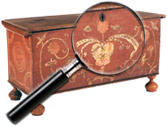Apocryphal – Definition
Apocryphal, the adjective form, means “of doubtful authenticity,” according to Merriam-Webster’s online dictionary. Apocrypha, the noun form, means “writings or statements of dubious authenticity,” again according to Merriam-Webster.
Apocrypha is actually a Greek word that means something closer to “obscure” or “hidden away.” The original meaning of the word, the Apocrypha in the proper noun sense, refers to religious texts outside of the traditional or accepted religious canon. Through connection with religious debates and disputes, the word picked up a more negative connotation, the one we now know, meaning something more akin to “false” or “spurious.”
In the antiques world, “apocryphal” tends to adhere closely to Merriam-Webster’s “doubtful authenticity.” It often indicates that a mark on a piece is questionable. For example, a Chinese vase may have characters marked on the base linking it to a certain artist, region or time period. Closer examination may reveal that the mark is above the glaze, meaning it was added after the firing, and “apocryphal” is the cataloguer’s way of conveying that because the mark could have been added five minutes or five hundred years after firing it is unreliable or thrown into question.
Auction houses also use “apocryphal” when relaying questionable anecdotes regarding origins or provenance or when the backstory of an object is almost too fantastical to be believed. The story of George Washington chopping down the cherry tree is an example most would be familiar with, but p4A item # D9956943 offers something closer to what is normally seen in the marketplace. This item, a photograph of the Sioux warrior Rain In The Face, has a story written on the back “describing the apocryphal story about Rain In The Face eating Tom Custer’s heart as revenge for his arrest.”
